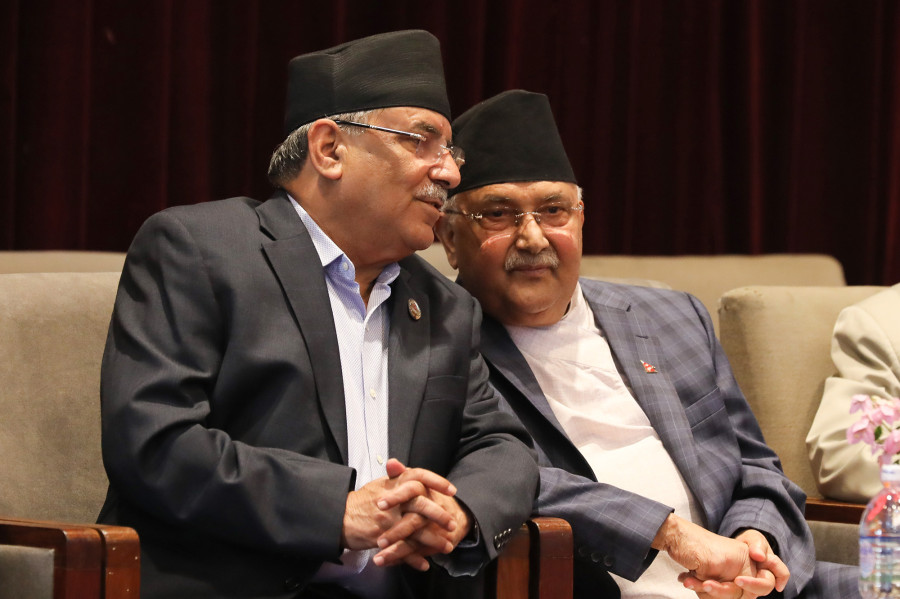Politics
Oli and Dahal present a unified face, but cracks are visible all over the ruling party
The Nepal Communist Party’s ongoing debate over ideology is simply a mask for a power grab, party insiders say
Tika R Pradhan
Pushpa Kamal Dahal and KP Sharma Oli stood together on Monday in a rare show of solidarity. The party appeared united and finally on the same page. But that show of support only hides widening fissures, say party insiders.
After lawmakers of the ruling party used Monday’s Parliamentary Party meeting to criticise the government’s performance and the functioning of the party, both co-chairmen, Oli and Dahal, stood together in defence in a semblance of order.
“But if someone could read between the lines, it would be clear that differences continue to persist between the two leaders,” said Rambir Manandhar, a party lawmaker. “Oli’s statement carried a tinge of satire.”
At the Monday meeting, Oli appeared to offer an olive branch to Dahal, displaying camaraderie and saying that he trusted Dahal so much that he had signed on to whatever document Dahal had prepared.
“But there was a tinge of satire in that statement,” said Manandhar.
Oli was referring to Dahal’s recent statements that a gentleman's agreement signed between the two leaders meant they would lead the government in turn—implying that Oli should step aside and allow Dahal to run government once his 15 months were over.
“Oli said he signed the document without even looking at it to show that he trusts Dahal completely, but that’s clearly not the case,” Manandhar told the Post.
Growing differences between Oli and Dahal have filtered down to the party rank-and-file, say insiders, with former CPN-UML and former Maoist leaders vertically divided over the government’s performance, the functioning of the party and its guiding ideology.
According to a leader who did not wish to be named, Oli’s proposal to adopt ‘People’s Multiparty Democracy’ as the party’s political line during a meeting on June 21—a day before the party’s latest Secretariat meeting—had led Dahal to become suspicious and hold meetings with leaders loyal to him.
Former Maoists, meanwhile, have been demanding that the unified party adopt a new and refined ideology and drop both ‘People’s Multiparty Democracy’ and ‘21st-century People’s Democracy’, their original political line.
Even as this debate continues, some party members believe that ideology is simply a mask for deeper structural issues within the party.
Ideology is not even an issue at this point in time, said Ghanshyam Bhusal, a standing committee member. “This is being raised to cover up other pressing issues where everyone has some kind of interest,” he said.
The party leadership has been struggling to decide on work divisions for its central committee members and fill vacancies in various party departments. Most importantly, the ruling Nepal Communist Party has been functioning without a politburo, a key committee for any communist party.
“Top leaders have their own lists for work divisions and they are fighting to ensure that their people get responsibilities,” said Bhusal.
There is an intense power play going on in the party and all efforts are aimed at a power grab, say party insiders.
As lawmakers criticised the leadership at Monday’s meeting for failing to take initiative to overcome mistrust in the party, Dahal too tried to allay their concerns, saying both he and Oli would “stand where they did during the time of unification” in May last year.
“We cannot say anything now,” Ghanashyam Bhusal, a standing committee member, told the Post. “Things could become clearer after Saturday’s Parliamentary Party meeting.”




 20.12°C Kathmandu
20.12°C Kathmandu















